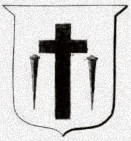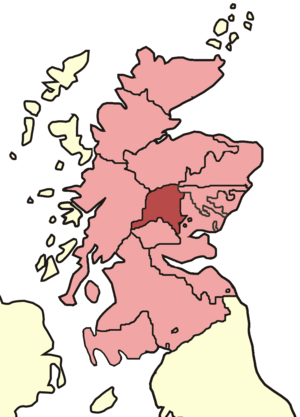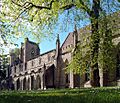Diocese of Dunkeld facts for kids
 |
|
| Head | Bishop of Dunkeld |
|---|---|
| Archdeacon(s) | Archdeacon of Dunkeld |
| Known rural deans | Angus (Rattray); Atholl; Drumalban; Fife & Fothriff; Lothian; Strathearn |
| First attestation | 865 x 1114 |
| Metropolitan before 1472 | None |
| Metropolitan after 1492 | Archbishop of Glasgow (until 1515) Archbishop of St Andrews (after 1515) |
| Cathedral | Dunkeld Cathedral |
| Dedication | Columba |
| Canons | Secular |
| Mensal churches | Abercorn, Aberdalgie, Aberlady, Alyth, Auchtergaven, Bunkle, Caputh, Cargill, Cramond, Dowally, Dunkeld, Forgandenny, Killespick-Kyril, Little Dunkeld, Obney, Pitcairn, Preston, Strathmiglo, Tibbermore |
| Common churches | Auchterhouse, Fortingall, Meigle, Saline |
| Prebendal churches | Aberlady, Alyth, Auchtergave, Clunie (Dean), Crieff, Dowally, Dunkeld (Treasurer), Fearn, Forgandenny, Inchaiden (Dean), Kinclaven (chanter), Lagganallachie (Archdeacon), Lethendy, (Chancellor), Little Dunkeld (Treasurer), Logiebride, Lumdeiff, Menmuir, Moneylie, Muckersie, Obney, Rattray (succentor), Tealing (Archdeacon) |
| Catholic successor | Merged into resurrected Roman Catholic Diocese of Dunkeld, March 4, 1878 |
| Episcopal successor | Diocese of Saint Andrews, Dunkeld and Dunblane |

The Diocese of Dunkeld was one of the 13 main church areas in Scotland. These areas existed before 1689, when a system of church leadership called "Episcopacy" was stopped. In this system, bishops were important leaders.
History of the Diocese
It is believed that the Diocese of Dunkeld was created around the middle of the 800s. The first leader was called the Bishop of Fortriu. Fortriu was the name of the kingdom of the northern Picts at that time.
This bishop was also known as the Abbot of Dunkeld. This might mean he had power over other monasteries in Scotland that followed Saint Columba. This power was once held by the famous monastery of Iona.
The new bishopric (the area a bishop oversees) likely covered a large part of what later became the Diocese of Argyll. It also kept control over many churches that were old Columban foundations.
There were 35 bishops of Dunkeld from when it started until the 1500s. This was when the Protestant Reformation happened. The Reformation was a big change in Christianity that led to new churches and different ways of worship. During this time, the Catholic Church's leadership in Scotland was stopped.
The main church, called a cathedral, was built in the town of Dunkeld in Perthshire. It was constructed between 1220 and 1500. After the Reformation, parts of the cathedral became ruins. However, the choir section is still used for Presbyterian worship today.
Even after the Reformation, the system of having bishops was not completely removed until 1689. There was a short time when bishops were removed from 1638 to the early 1660s.
The Catholic Church brought back the Diocese of Dunkeld on March 4, 1878. This was done by Pope Leo XIII. The new Roman Catholic Diocese of Dunkeld has different borders than the old one. It is now part of a larger church area led by an archbishop, called the province of St. Andrews and Edinburgh.
This modern diocese includes the areas of Perth, Angus, Clackmannan, Kinross, and northern Fife. The main church for this diocese is now in Dundee. It is dedicated to Saint Andrew, not Saint Columba. Most Catholics in the modern diocese live in Dundee.
Bishops of Dunkeld
If you want to learn more about the bishops who led the Diocese of Dunkeld throughout history, you can visit the main article here:
See also
- Bishop of Dunkeld, the historical bishop.
- Bishop of Dunkeld (Roman Catholic), the restored Roman Catholic Bishop.
- Roman Catholic Diocese of Dunkeld, the restored Roman Catholic Diocese.
- Bishop of Saint Andrews, Dunkeld and Dunblane, the Scottish Episcopal Bishop.
- Diocese of Saint Andrews, Dunkeld and Dunblane, the Scottish Episcopal Diocese.
Images for kids
-
The partially ruined, partially restored Cathedral of St Columba at Dunkeld. It now operates as a Church of Scotland church.
 | Anna J. Cooper |
 | Mary McLeod Bethune |
 | Lillie Mae Bradford |


